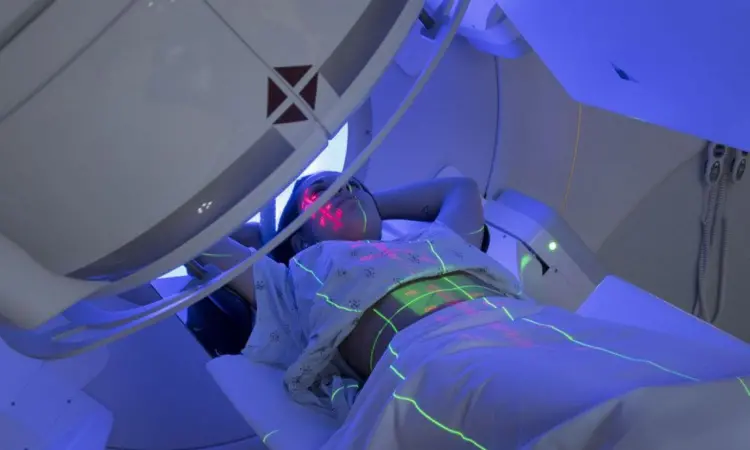- Home
- Medical news & Guidelines
- Anesthesiology
- Cardiology and CTVS
- Critical Care
- Dentistry
- Dermatology
- Diabetes and Endocrinology
- ENT
- Gastroenterology
- Medicine
- Nephrology
- Neurology
- Obstretics-Gynaecology
- Oncology
- Ophthalmology
- Orthopaedics
- Pediatrics-Neonatology
- Psychiatry
- Pulmonology
- Radiology
- Surgery
- Urology
- Laboratory Medicine
- Diet
- Nursing
- Paramedical
- Physiotherapy
- Health news
- Fact Check
- Bone Health Fact Check
- Brain Health Fact Check
- Cancer Related Fact Check
- Child Care Fact Check
- Dental and oral health fact check
- Diabetes and metabolic health fact check
- Diet and Nutrition Fact Check
- Eye and ENT Care Fact Check
- Fitness fact check
- Gut health fact check
- Heart health fact check
- Kidney health fact check
- Medical education fact check
- Men's health fact check
- Respiratory fact check
- Skin and hair care fact check
- Vaccine and Immunization fact check
- Women's health fact check
- AYUSH
- State News
- Andaman and Nicobar Islands
- Andhra Pradesh
- Arunachal Pradesh
- Assam
- Bihar
- Chandigarh
- Chattisgarh
- Dadra and Nagar Haveli
- Daman and Diu
- Delhi
- Goa
- Gujarat
- Haryana
- Himachal Pradesh
- Jammu & Kashmir
- Jharkhand
- Karnataka
- Kerala
- Ladakh
- Lakshadweep
- Madhya Pradesh
- Maharashtra
- Manipur
- Meghalaya
- Mizoram
- Nagaland
- Odisha
- Puducherry
- Punjab
- Rajasthan
- Sikkim
- Tamil Nadu
- Telangana
- Tripura
- Uttar Pradesh
- Uttrakhand
- West Bengal
- Medical Education
- Industry
Adjuvant Radiotherapy or ET Lowers Locoregional Recurrence Rates Risk in Early-Stage Breast Cancer: JAMA

USA: Researchers have found in a new study that adjuvant radiotherapy (RT) or endocrine therapy (ET) significantly reduces the risk of locoregional recurrence (LRR) in patients with early-stage breast cancer and low genomic risk.
The findings, published in JAMA Network Open by David Gibbes Miller from the Department of Radiation Oncology, Memorial Sloan Kettering Cancer Center, New York, and colleagues, highlight the importance of treatment adherence and suggest the potential role of genomic biomarkers in guiding de-escalation strategies.
The study addressed a critical question in breast cancer management: whether omission of RT or ET is associated with higher rates of recurrence among women with favorable tumor biology. Although treatment de-escalation is often considered for older women with early-stage breast cancer, limited evidence exists on whether younger patients could also safely undergo less intensive treatment with guidance from biomarker testing, such as the Oncotype DX 21-gene recurrence score (ODX RS).
The researchers examined outcomes for 2249 women aged 50 to 69 years, all of whom had hormone receptor–positive, ERBB2-negative, stage T1N0 breast cancer with an ODX RS of 18 or below. All patients underwent lumpectomy between January 2007 and January 2023. Among them, 92.3 percent also received RT alongside ET. Patients were classified based on adherence to ET, defined as taking ET for at least five years or continuing treatment at the last follow-up. The median follow-up period was 63.3 months, allowing long-term assessment of outcomes.
The key findings of the study were as follows:
- The 72-month cumulative incidence of locoregional recurrence (LRR) was 8.0% in patients who did not receive radiotherapy (RT), compared with 1.1% in those who underwent RT, showing a significant difference.
- Patients receiving RT had the lowest recurrence risk regardless of endocrine therapy (ET) adherence.
- The combination of RT and adherence to ET resulted in a 72-month LRR of 1.1%.
- RT with ET nonadherence showed a similar 72-month LRR of 0.9%.
- ET alone, when adhered to but without RT, was linked to a higher 72-month LRR of 5.5%.
- The highest recurrence rate, 11%, occurred in patients who received neither RT nor adhered to ET.
An important observation was that receipt of RT did not significantly impact overall survival, suggesting that its main benefit lies in local disease control rather than extending lifespan. Still, the analysis clearly indicates that adherence to at least one adjuvant modality remains vital in reducing recurrence among patients even when they have low genomic risk.
The authors note that while the absolute recurrence risk remains low for this group, the relative reduction achieved through adjuvant therapy is meaningful. They argue that the ODX RS may serve as a valuable tool in determining which younger patients might accept modestly higher recurrence risks in exchange for reduced therapy burden. However, they caution that each treatment approach carries its own risks and adverse effects, making shared decision-making between clinicians and patients essential.
"The cohort study demonstrates that both radiotherapy and endocrine therapy significantly lower the chances of locoregional recurrence in women with early-stage, low genomic risk breast cancer. For patients unwilling to receive both therapies, adherence to at least one still provides substantial benefit, reinforcing the importance of individualized treatment plans based on genomic testing and patient preferences," the authors concluded.
Reference:
Miller DG, Boe LA, Wen HY, et al. Adjuvant Radiation and Endocrine Therapy in Early-Stage Breast Cancer With Low Genomic Risk. JAMA Netw Open. 2025;8(9):e2532305. doi:10.1001/jamanetworkopen.2025.32305
Dr Kamal Kant Kohli-MBBS, DTCD- a chest specialist with more than 30 years of practice and a flair for writing clinical articles, Dr Kamal Kant Kohli joined Medical Dialogues as a Chief Editor of Medical News. Besides writing articles, as an editor, he proofreads and verifies all the medical content published on Medical Dialogues including those coming from journals, studies,medical conferences,guidelines etc. Email: drkohli@medicaldialogues.in. Contact no. 011-43720751
Next Story


